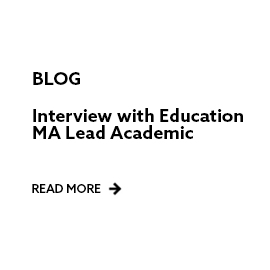At Northumbria University, we’re proud to offer online courses that are every bit as engaging and fulfilling for students as our on-campus programmes. Through our bespoke distance learning facilities, we’re able to deliver this Education MA course to students who either can’t travel into the University or are looking for the convenience of learning from home – saving both living and travel expenses.
Upon graduating you’ll receive the same Masters degree qualification as you would if you were an on-campus student; there’s no mention of ‘online’ anywhere on your degree certificate.
We’ve designed this Masters in partnership with digital learning experts to make sure you get the most flexible and engaging experience possible. We understand all our students are different and lead busy lives. That’s why our focus is on self-paced, interactive learning that will allow you the freedom to study whenever and wherever it suits you. The recommended study time for the course is around 15 hours a week.
You will access all your learning materials through our eLearning portal, Blackboard Ultra. You study one 20-credit module at a time, each lasting 10 weeks (plus one week for assessment) as well as your final 60-credit Systematic Appraisal. The form of your assessments will vary between modules – it could be an essay or a multiple-choice exam – but all of them will be submitted online. There will be no need to come to campus at any point during your course.
Each of our modules has been carefully designed to ensure you gain the necessary knowledge about that topic in the most engaging way. However, all the modules will be split into multiple sessions and follow a three-stage structure: Learn, Explore and Apply.
In each teaching week, you’ll have the chance to engage with interactive tools and media, ranging from text-based to video/audio (“Learn”), as well as complete online readings (“Explore”) in your own time. There will also be the chance to test yourself and receive formative feedback.
You’ll join a supportive, lively online community. Throughout the course, you will participate in virtual discussion boards with your academics and fellow students, sharing your thoughts, knowledge and experience with them as you learn (“Apply”). In addition, you will be able to attend live webinars on key aspects of the module and its delivery/structure, such as assessments. These sessions will offer you the chance to engage with your tutors in real time and ask any questions you have about the course. If you are unable to attend these scheduled sessions, they will also be recorded so you can watch them at a time that works for you.
As well as the support of your module tutors and fellow students, you’ll have a personal Student Success Advisor who'll be on hand from day one through to graduation. Whether you need pastoral guidance, help with assessments or advice about fees, they will be with you at every step. Blackboard Ultra also offers 24/7 access to a range of advice and support services, such as Ask4Help, too.
You will also be able to access over half a million books and e-books through our online University Library Services.
 Option for Placement Year
Option for Placement Year Option for Study Abroad
Option for Study Abroad








